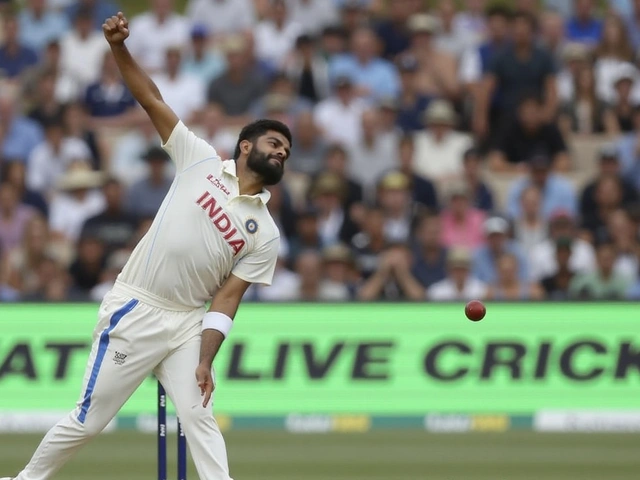When Noman Ali, off‑spin bowler for Pakistan Cricket Board cracked the top‑six of the ICC Men's Test Bowling Rankings on 12 October 2025, the cricket world took notice. The rise comes just weeks after the ICC, based in Dubai, published its latest rating list, and it signals a possible resurgence for Pakistan spinners on the longest format.
Why the Rankings Matter
The ICC’s ranking system translates every Test spell into points, rewarding consistency, strike‑rate and match impact. A climb into the upper‑echelons isn’t just a vanity metric; it often translates into higher pay, more media attention, and, crucially, a stronger voice in selection committees. For a nation that has traditionally relied on pace, a spinner reaching rank 6 is a game‑changer.
Current Landscape of Test Bowling
Here’s the latest top‑five, straight from the ICC release:
- Jasprit Bumrah (India) – 885 points
- Kagiso Rabada (South Africa) – 851 points
- Matt Henry (New Zealand) – 846 points
- Pat Cummins (Australia) – 838 points
- Josh Hazlewood (Australia) – 815 points
Trailing these giants is Noman Ali with 806 points, perched just nine points shy of Hazlewood. The gap is narrow enough that a couple of five‑wicket hauls could see the Pakistani bowler break into the top‑five soon.
What Prompted Noman Ali’s Surge?
Ali’s ascent is rooted in a string of disciplined performances over the past twelve months. In the 2024‑25 series against West Indies, he bowled 36 overs in the second Test, claiming 5/67 on a turning track in Bridgetown. The following home series against Bangladesh saw him pick up 4/45 at Gaddafi Stadium, where he bowled 22 consecutive economical overs – a statistical highlight that the ICC’s algorithm rewards heavily.
Cricket analyst Rahul Sharma noted, “Ali’s ability to keep the foot‑marks tight while extracting turn is what the rankings engine loves. He’s not just a wicket‑taker; he’s a pressure‑builder.”
Other Pakistani Spin Prospects
While Ali leads the charge, the PCB’s spin department boasts depth. Leg‑spinner Shahnawaz Dahani has been hovering around rank 20, and off‑spinner Usman Qadir posted a career‑best 4/62 against Sri Lanka earlier this year. The collective rise suggests a strategic shift: instead of stacking the pace attack, selectors may now lean on a balanced combination of seam and spin.
Reactions from the PCB and Players
PCB chairman Ramiz Raja praised the achievement, saying, “Noman’s ranking is a testament to the hard work of our spin coaches and the patience of our fans. It gives us confidence ahead of the upcoming England series.”
Veteran fast‑bowler Mohammad Abbas added, “We all benefit when a spinner can hold one end steady. It lets the pacers attack more freely.”
Global Implications
The shift isn’t isolated. Historically, teams with a strong spin option have fared better in sub‑continental conditions, but the modern game demands versatility. As the ICC’s ranking algorithm evolves to weight performance against top‑ranked opponents more heavily, a spinner like Ali who’s proven himself against both low‑ and high‑ranked batsmen stands to climb even higher.
For India, Bumrah’s dominance remains unchallenged, yet the presence of an emerging Pakistani spinner adds a new tactical layer to any potential bilateral series. South Africa’s Rabada, known for his pace aggression, could find himself paired against a spin threat that forces him to alter his usual attacking rhythm.
What’s Next for Pakistan?
The immediate calendar features a three‑Test tour of England starting in December 2025. The English pitches at Lord’s and The Oval traditionally favour seam, but recent summers have produced slower, more spin‑friendly surfaces. If Ali maintains his current form, the PCB is likely to slot him into the playing XI for the second and third Tests, giving the team a two‑pronged attack.
Looking ahead, the ICC’s next ranking update is slated for 15 January 2026. Analysts predict that if Ali adds another five‑wicket haul before then, he could breach the top‑five, potentially shaking up the global hierarchy for the first time since 2019.
Frequently Asked Questions
How does Noman Ali's rise affect Pakistan's Test prospects?
Ali’s top‑six ranking gives Pakistan a credible spin option alongside its pace attack, allowing for more balanced line‑ups, especially on turning tracks. It also boosts morale and forces opponents to plan for two distinct threats.
Which performances pushed Ali into the top‑six?
Key spells include 5/67 against West Indies in Bridgetown (June 2024) and 4/45 versus Bangladesh at Gaddafi Stadium (March 2025). Both innings featured long, economical spells that the ICC rating system heavily rewards.
Who currently leads the ICC Test bowling rankings?
India’s Jasprit Bumrah tops the list with 885 rating points, followed by South Africa’s Kagiso Rabada (851) and New Zealand’s Matt Henry (846).
Will this shift influence selection for the upcoming England series?
Most pundits expect Ali to start the second Test in England, giving the side a spin option on potentially slower pitches. His inclusion could also see a reshuffle of the fourth‑day strategy, balancing aggression with control.
What do experts say about Pakistan’s spin options now?
Analysts like Rahul Sharma argue that Pakistan’s spin pool has matured, citing the rise of Ali, Dahani and Qadir. He notes that the combination of off‑spin precision and leg‑spin variation gives the team flexibility across different conditions.





Comments
Noman Ali’s top‑six spot is overrated; the rankings are a sham that rewards low‑impact overs.
His 5/67 at Bridgetown and 4/45 against Bangladesh pushed his rating over 800 points, which is the threshold for entry into the elite group.
What a milestone for the young off‑spinner – his consistency shows the spin department’s hard work is finally paying off, and the team can build a solid attack around his control.
Honestly, Pakistan’s spin scene finally gets the respect it deserves – Noman’s rise is proof that our cricketing talent can’t be ignored, even if the boards try to downplay it.
Seeing a player from a traditionally pace‑focused nation climb into the top‑six invites a deeper reflection on how cricket evolves beyond raw speed. The sport, at its core, is a dialogue between art and science, where spin offers a subtler language of deception. Noman Ali’s methodical economy, as displayed in his 22‑over spell against Bangladesh, exemplifies patience over power. In a world that glorifies instant results, his steady accumulation of wickets mirrors the virtue of perseverance. The ICC’s algorithm, while statistical, rewards this very discipline, turning consistent performance into tangible rank. Moreover, his ascent challenges the stereotype that sub‑continental conditions alone nurture spin; it underscores skill adaptability across varied pitches. For emerging cricketers, his journey becomes a case study in leveraging opportunities without succumbing to hype. The psychological pressure of being ranked among the elite can be a double‑edged sword, yet Ali appears unfazed, perhaps because he views the ranking as a metric, not a destiny. This mindset aligns with the philosophical notion that external validation should not dictate internal motivation. As Pakistan prepares for the England tour, the strategic inclusion of a top‑six spinner adds a layer of tactical depth that pure pace cannot provide. The balance between seam and turn may well decide the series outcome on slower, weather‑affected surfaces. From an analytical perspective, Ali’s figures contribute positively to the team’s overall bowling average, a metric often overlooked by casual fans. His success also signals to selectors that nurturing spin talent yields dividends, potentially reshaping recruitment policies. In broader terms, the rise of a Pakistani spinner at this level challenges the dominance of traditional powerhouses, hinting at a more democratized future for Test cricket. Ultimately, the narrative extends beyond numbers; it becomes a testament to the enduring relevance of spin in the modern game.
Indeed, his ability to maintain a tight line, to vary flight, to extract bounce where the pitch offers it, and to keep the batsmen guessing, all point to a bowler who has mastered the nuances of the craft, and that is precisely what the team needs at this juncture.
Yo fam, Noman’s on fire🔥, finally Pakistan’s spin finally gets the love it deserves… can't wait to see him crush the English batsmen at Lord’s!! 😂
Let’s keep the momentum rolling, boys – if Ali can break into the top‑six, the whole squad can push harder and claim those wins on foreign soil!
They don’t want you to notice how the ranking formula was tweaked last season to favor pace, so Noman’s climb is actually a hidden protest against the system.
From the bustling streets of Lahore to the historic greens of England, this achievement weaves a tapestry of pride that binds our nation’s love for cricket across generations.
Oh great, another “top‑6” spin bowler – just what the world needed.
Honestly, I think the PCB leaked his stats early to distract from the real agenda of reshaping the Test schedule in favor of revenue.
It is absolutely essential for the proud sons of this great nation to see a spin maestro like Noman Ali scale the lofty heights of the ICC rankings, because every time a Pakistani name appears among the elite, it reinforces the narrative that our country, despite countless challenges, continues to produce world‑class talent that can stand toe‑to‑toe with the best, and this, my friends, is not merely a personal triumph but a collective victory that showcases the resilience, the grit, and the undying spirit of our people, a spirit that refuses to be subdued by colonial legacies or external criticisms, and as we look ahead to the forthcoming England tour, we must remember that our success rests not only on the shoulders of our fast bowlers but also on the deft fingers of our spinners, who, like Noman, have honed their craft in the dusty grounds of Karachi and the verdant slopes of Murree, turning adversity into opportunity, and it is this very journey that will inspire future generations to pick up a ball, a bat, and dream of wearing the green jersey on the world stage.
From a performance‑analytics standpoint, integrating Ali’s spin metrics-such as his spin rate of 1,200 rpm and his release angle variance of 7°-into the bowling unit’s strategic model will enhance the predictive win probability algorithm for upcoming Test fixtures.